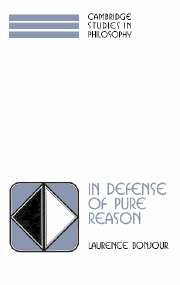Book contents
- Frontmatter
- Contents
- Preface
- Acknowledgments
- 1 Introduction: the problem of a priori justification
- 2 In search of moderate empiricism
- 3 Quine and radical empiricism
- 4 A moderate rationalism
- 5 Epistemological objections to rationalism
- 6 Metaphysical objections to rationalism
- 7 The justification of induction
- Appendix: Non-Euclidean geometry and relativity
- References
- Index
2 - In search of moderate empiricism
Published online by Cambridge University Press: 08 January 2010
- Frontmatter
- Contents
- Preface
- Acknowledgments
- 1 Introduction: the problem of a priori justification
- 2 In search of moderate empiricism
- 3 Quine and radical empiricism
- 4 A moderate rationalism
- 5 Epistemological objections to rationalism
- 6 Metaphysical objections to rationalism
- 7 The justification of induction
- Appendix: Non-Euclidean geometry and relativity
- References
- Index
Summary
INTRODUCTION
As explained in the previous chapter, the moderate empiricist position on a priori knowledge holds that while such knowledge genuinely exists and has occasional importance in its own distinctive way, it is nonetheless merely analytic in character – that is, very roughly, merely a product of human concepts, meanings, definitions, or linguistic conventions. Such knowledge thus says nothing substantive about the world, and its justification can be accounted for without appealing to anything as problematic as the rationalist idea of rational insight into the character of an sich reality. Indeed, as we shall see later in this chapter, it is this alleged capacity to provide an unproblematic explanation of a priori justification that constitutes the main argument for moderate empiricism, even in the face of recalcitrant rationalist counterexamples.
For much of this century, this general sort of position had the status of virtually unquestioned orthodoxy for most philosophers in the Anglo-American tradition; and despite the recent prominence of the radical empiricist views that will be discussed in the next chapter, it seems likely that moderate empiricism continues to be the most widely held view of the nature and status of a priori justification. What is profoundly misleading about the foregoing picture, however, is the suggestion that there is anything like one reasonably specific position that can be identified as moderate empiricism.
- Type
- Chapter
- Information
- In Defense of Pure ReasonA Rationalist Account of A Priori Justification, pp. 28 - 61Publisher: Cambridge University PressPrint publication year: 1997



